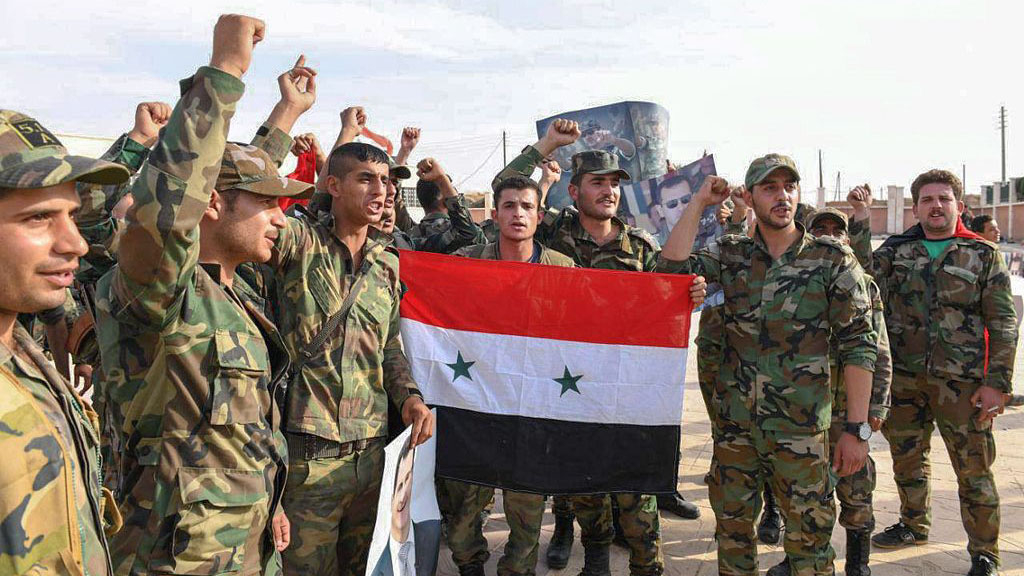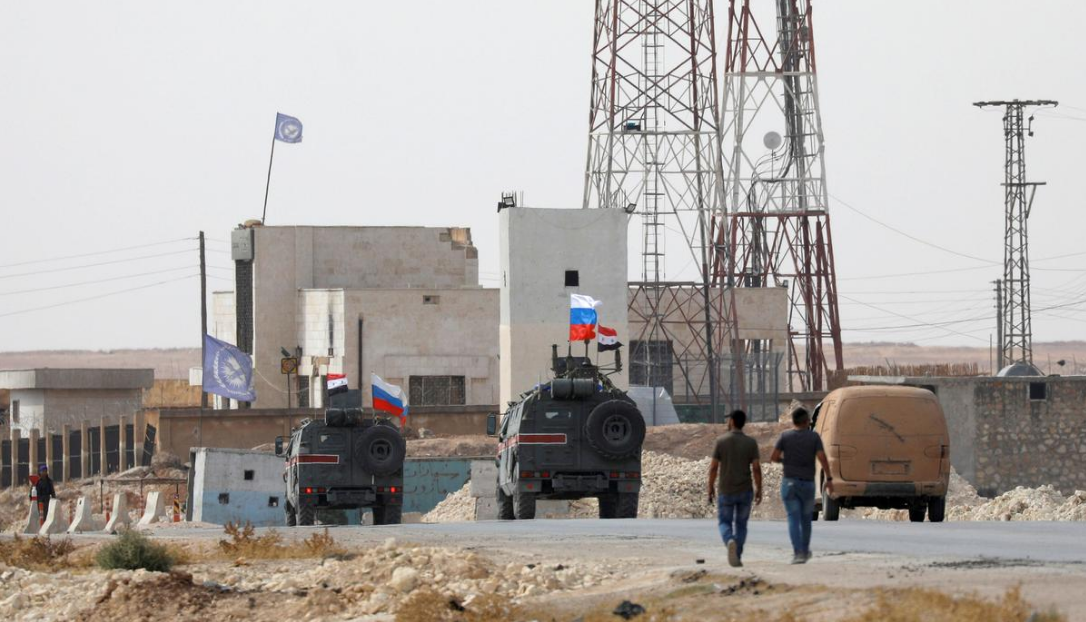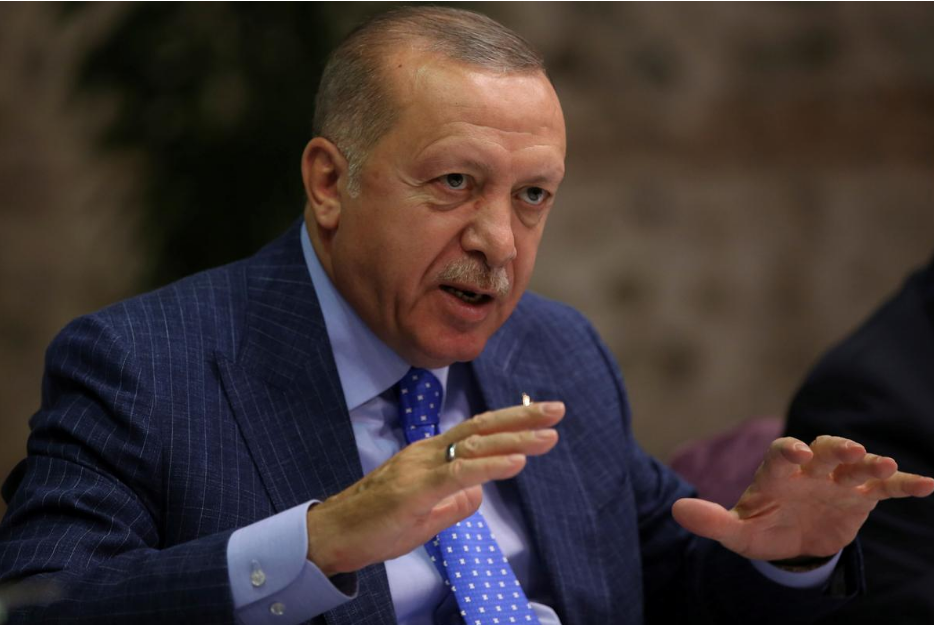00:37

Turkey rebuffed international pressure to curb its cross-border military offensive against the Syrian Kurdish YPG militias on Wednesday as U.S. President Donald Trump dispatched his deputy Mike Pence to Ankara to demand a ceasefire, while the Syrian army moved on the key city of Manbij that was abandoned by U.S. forces.
Turkish President Recep Tayyip Erdogan on Wednesday said that he would not meet Pence and rejected any negotiations, telling parliament the only way to solve Syria's problems was for the Kurdish forces to "lay down their arms... destroy all their traps and get out of the safe zone that we have designated."
There was confusion, however, after Erdogan told reporters he would not meet with Pence -- a position that was later reversed by his office. Erdogan's communications director Fahrettin Altun said on Twitter the meeting would go ahead after all.
Battles raged in the key Syrian border town of Ras al-Ain on Wednesday, with Kurdish fighters burning tires in a bid to blind Ankara's warplanes and digging in against a ground offensive by Turkish-backed Syrian rebels.
The operation, launched a week ago, has triggered a flurry of diplomacy among major powers.
Click for more international reactions to Turkey's Syria offensive

Russian and Syrian national flags flutter on military vehicles near Manbij, Syria, October 15, 2019. /Reuters Photo
Russian and Syrian national flags flutter on military vehicles near Manbij, Syria, October 15, 2019. /Reuters Photo
Pivot to Russia
Trump sent Pence along with his top diplomat Mike Pompeo to Turkey amid the greatest crisis in relations for decades between the NATO allies.
Moscow has stepped into the void left by Trump's withdrawal of U.S. troops from northern Syria, deploying patrols to prevent clashes between Syrian and Turkish forces. Russian TV showed its forces alongside Syrian government troops taking up positions in and around the town of Manbij following the U.S. pull-back.
The Kremlin said it would host Erdogan for a meeting with his Russian counterpart Vladimir Putin in the coming days, to ensure the operation does not turn into all-out war between Turkey and Syria.
Trump -- facing mounting criticism in Washington over his decision to pull 1,000 troops out of the conflict zone, as well as an unrelated impeachment inquiry -- has hit back at Erdogan, slapping sanctions on three cabinet officials and raising tariffs on Turkish steel.
Pence's office released a statement that he would meet Erdogan on Thursday and "voice the United States' commitment to reach an immediate ceasefire and the conditions for a negotiated settlement" despite the earlier statement by Erdogan that he would not meet visiting.
He reiterated that Trump will pursue "punishing economic sanctions" until a resolution is reached.

Turkish President Tayyip Erdogan talks to journalists in Istanbul, Turkey, October 13, 2019. /Reuters Photo
Turkish President Tayyip Erdogan talks to journalists in Istanbul, Turkey, October 13, 2019. /Reuters Photo
'Not worried'
However, speaking to reporters on a flight back from Baku, Erdogan said the offensive would continue until it reaches its aims, and added that he was not worried about sanctions.
"They say 'declare a ceasefire.' We will never declare a ceasefire," Erdogan said. "They are pressuring us to stop the operation. They are announcing sanctions. Our goal is clear. We are not worried about any sanctions," he said.
The operation has widespread support in Turkey, where decades of bloody insurgency by Kurdish militants have killed tens of thousands of people.
Trump's decision to withdraw U.S. troops from northern Syria after a phone call with Erdogan not only cleared the way for the Turkish incursion, but it also gives a free hand to Washington's adversaries in the world's deadliest ongoing war, namely Syrian President Bashar al-Assad, Russia and Iran.
Syrian army deployments into Kurdish-held territory mark a victory for Syria and Russia, giving them a foothold in the biggest remaining swathe of Syria that had been beyond their grasp through much of its eight-year-old war.
Asked about the deployment of Syrian forces to the northern town of Manbij, Erdogan, who has backed Syrian rebels fighting to oust Assad, said he was not bothered.
"The regime entering Manbij is not very negative for me. Why? It's their lands after all. But, what is important to me is that the terrorist organization does not remain there," Erdogan said, referring to the YPG.
"I told this to Mr. Putin as well. If you are clearing Manbij of terrorist organizations, then go ahead, you or the regime can provide all the logistics. But if you are not going to do this, the people there are telling us to save them," he added.
Erdogan also said that an attack from Manbij on Tuesday, which killed one Turkish soldier, was launched by the Syrian government, and that Turkey "made the regime pay a heavy price" in retaliation.